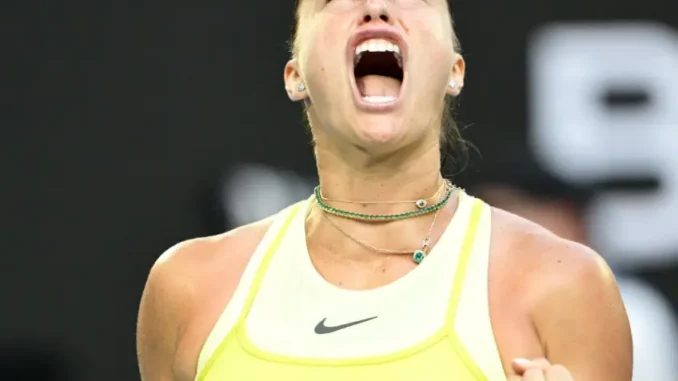
The sun beat down on the hard courts, the echoes of the crowd’s roar still ringing in her ears, but for Aryna Sabalenka, the sting of defeat lingered. The Australian Open, a tournament she had entered with high hopes and soaring expectations, had ended in disappointment. The loss, a tough pill to swallow, left her feeling deflated, a sense of frustration and sadness washing over her. It wasn’t just a match lost; it was an opportunity missed, a chance to etch her name into the annals of Grand Slam history that slipped through her fingers. The weight of expectation, the pressure to perform, the disappointment of falling short – all these emotions coalesced into a feeling of depression that settled over her like a cloud.
“I was really depressed after the Australian Open,” Sabalenka admitted, her words revealing the depth of her disappointment. This wasn’t just a passing feeling; it was a genuine emotional setback, a period of introspection and reflection. The loss had clearly affected her deeply, prompting her to confront her shortcomings and analyze what went wrong. It’s a testament to her character that she openly acknowledged her feelings, demonstrating a vulnerability that resonates with fans and highlights the emotional rollercoaster that comes with competing at the highest level of professional sport.
The world of professional tennis is a high-stakes arena, where the margins between victory and defeat are often razor thin. The pressure to perform is immense, and athletes are constantly under scrutiny, their every move analyzed and dissected. For Sabalenka, the Australian Open represented a chance to prove herself, to solidify her place among the elite players in the world. But despite her best efforts, she fell short, leaving her feeling dejected and questioning her own abilities.
“It took me a few days to get over it,” Sabalenka confessed, revealing the time it took for her to process the loss and begin the healing process. This underscores the emotional toll that defeats can take on athletes, even those as tough and resilient as Sabalenka. It’s a reminder that athletes are not just machines; they are human beings with emotions, vulnerabilities, and the capacity to experience both the highs and lows of competition.
The journey of a professional athlete is filled with peaks and valleys, moments of triumph and moments of despair. It’s a constant cycle of striving, achieving, falling short, and picking oneself up again. Sabalenka’s experience after the Australian Open is a perfect example of this cycle. She experienced the disappointment of defeat, but she didn’t allow it to define her. Instead, she used it as a learning opportunity, a chance to grow and come back stronger.
“But now I’m feeling better and I’m ready to compete in Doha,” Sabalenka declared, her words reflecting her resilience and her determination to bounce back. This is the mark of a true champion – the ability to overcome adversity, to learn from setbacks, and to come back stronger and more focused. Sabalenka’s decision to compete in Doha so soon after the Australian Open demonstrates her commitment to her sport and her desire to prove herself.
The Doha Open presents a new challenge, a fresh start, a chance to put the disappointment of the Australian Open behind her and focus on the present. It’s an opportunity to showcase her skills, to compete against top players, and to rebuild her confidence. It’s a chance to demonstrate her resilience and her unwavering determination to succeed.
“I’m excited to be here in Doha,” Sabalenka stated, her words conveying her enthusiasm for the upcoming tournament. This is not just a perfunctory statement; it’s a genuine expression of her eagerness to compete and to put on a good show for the fans. She is clearly looking forward to the challenge, embracing the opportunity to test herself against the best players in the world.
The Doha Open is a prestigious tournament, attracting a strong field of competitors. This provides Sabalenka with the perfect platform to measure her progress and to gauge her form. It’s a chance to see how she has responded to the disappointment of the Australian Open and whether she has learned from her mistakes.
“I’m going to give it my all,” Sabalenka vowed, her words reflecting her commitment and her determination to succeed. This is not just a casual promise; it’s a declaration of intent, a statement that she is prepared to leave everything on the court. She is determined to put the past behind her and focus on the present, giving her best effort in every match.
The journey of a professional athlete is a constant process of growth and evolution. Sabalenka’s experience after the Australian Open is a testament to this process. She faced disappointment, she acknowledged her feelings, and she learned from her mistakes. Now, she is ready to move forward, to compete in Doha, and to continue her pursuit of excellence. Her resilience, her determination, and her unwavering commitment to her sport make her a true champion, and the world eagerly awaits to see what she will accomplish next.
Leave a Reply